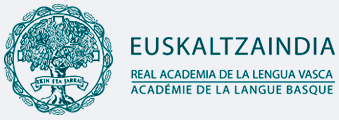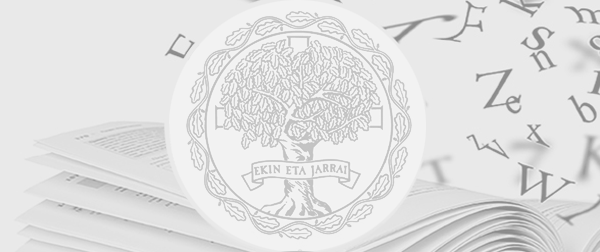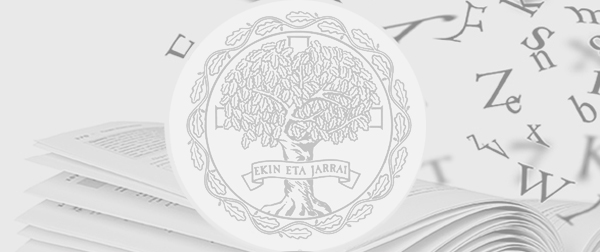Uncategorised Article Count: 13
Plazaberri Article Count: 0
Harpidetza Article Count: 1
Erakundea Article Count: 0
Erakundea Article Count: 2
Bestelakoak Article Count: 5
Organigrama Article Count: 0
Orokorra Article Count: 4
Euskaltzain osoak Article Count: 34
Euskaltzain ohorezkoak Article Count: 59
Euskaltzain urgazleak Article Count: 0
A Article Count: 25
B Article Count: 12
C Article Count: 3
D Article Count: 1
E Article Count: 19
F Article Count: 1
G Article Count: 14
I Article Count: 7
J Article Count: 5
K Article Count: 3
L Article Count: 5
M Article Count: 8
N Article Count: 1
O Article Count: 9
P Article Count: 6
R Article Count: 2
S Article Count: 7
T Article Count: 1
U Article Count: 2
V Article Count: 1
Z Article Count: 4
Hildako euskaltzainak Article Count: 0
Ohorezkoak Article Count: 87
Urgazleak Article Count: 0
A Article Count: 27
B Article Count: 15
C Article Count: 6
D Article Count: 10
E Article Count: 21
F Article Count: 3
G Article Count: 14
H Article Count: 2
I Article Count: 10
J Article Count: 3
K Article Count: 3
L Article Count: 16
M Article Count: 13
N Article Count: 1
O Article Count: 8
P Article Count: 1
R Article Count: 1
S Article Count: 10
T Article Count: 5
U Article Count: 9
V Article Count: 2
W Article Count: 1
Z Article Count: 10
Osoak Article Count: 65
Baliabideak arloka Article Count: 0
Hiztegiak eta Corpusak Article Count: 11
Gramatika Article Count: 1
Dialektologia Article Count: 5
Euskararen sustapena Article Count: 1
Baliabide orokorrak Article Count: 0
Baliabide orokorrak Article Count: 1
Argitalpenen bertsio elektronikoak Article Count: 0
Aldizkariak Article Count: 2
Beste argitalpenak Article Count: 7
Batzordeak eta lantaldeak Article Count: 1
Azkue Biblioteka eta Artxiboa Article Count: 0
Bibliotekaren berri Article Count: 1
Zerbitzuak Article Count: 1
Azkue sariketak (1975-1990) Article Count: 3
BBK-Euskaltzaindia sariak Article Count: 5
Menu orriak 1 Article Count: 8
Menu orriak 2 Article Count: 23
Hitz-elkarketa/2 Article Count: 21
Mendeurren weba Article Count: 5
Egitaraua Article Count: 0
EGITARAUA
Jardunaldi akademikoak Article Count: 13
Ekitaldi instituzionalak Article Count: 2
Ekitaldi artistiko-kulturalak Article Count: 7
Bestelako ekimenak Article Count: 1
Erakusketa birtualak Article Count: 1

Joana Albret (1528-1572)
Azkue Biblioteka eta Artxiboak mota askotako liburu, aldizkari edota dokumentuak zaintzen ditu bere funtsetan. Horietako asko nahiko ezagunak izaten dira, euskaltzaleen artean bederen, baina beste batzuk askoz ere gutxiago edo batere ez. Gainera, batzuen aleak erraz eskura daitezke Euskal Herriko biblioteka eta artxibo askotan, baina beste batzuk, ordea, oso ezagunak eta aipatuak diren arren nekez jartzen dira euskaltzalearen begipean, hain zuzen ere bakanak direlako.
Txoko honetan jendeaurrean jarri nahi genituzke ale bakan edota gutxi ezagun horietako batzuen kopia digitalak, beren historia eta testuinguruari buruzko azalpen labur batzuekin lagunduta. Hartara, Etxeparek zioen bezala, obra bitxi horien ezagutza hatse honetik dadin aitzinerat augmenta, kontinua eta publika mundu guzietara.
Euskararen batasuna: Baionako Euskal Idazkaritza (1964) (aurreko erakusketaren jarraipena) Article Count: 6
Aurreko erakusketan hurbilpen orokor bat egin ondoren, ildo beretik xehetasun gehiago eskaintzea da oraingo helburua. Horretarako, azken hilabeteotan Ipar Euskal Herriko hainbat herritan egiten ari den erakusketa ibiltaria (Baiona, Maule, Hazparne...) izango da abiapuntua. Eta euskara batuaren genesiari buruz orain arte erabat ezezagunak izan diren zenbait datu eta dokumentu.
Euskararen batasuna: Baionako Euskal Idazkaritza (1964) eta Arantzazuko Biltzarra (1968) Article Count: 7
Euskara batuaren sorrera prozesu zinez korapilatsua izan zen, gertakari asko eta protagonista ugari barnebiltzen dituena. Ez da erraz horren ikuspegi sintetiko bat ematea, baina erakusketa honetan ahalegin bat egin da gertakari nagusiak eta eragile nabarmenetako batzuk laburki aurkezteko, historia luze eta aberats batean murgiltzeko zantzu batzuk eskainiz. Baionako Biltzarrari dagozkionak, bereziki, gutxi aipatuak izan dira oraintsu arte.
Euskal literatura: zenbait liburu zahar eta bitxi Article Count: 7
Topiko bat da esatea euskal literatura bitxikeriaz beteta dagoela eta, topiko guztietan bezala, puntu bateraino egia da: euskal literaturaren esparruan asko dira dauden liburu bitxiak edo gutxi ezagunak. Edo askotan aipatzen diren arren, ale gutxi batzuk baino ez gelditu ez zaizkgunak; batzutan, ale bakanak edo bakarrak. Mitxelenari jarraiki, gainera, euskal literatura batez ere euskaraz idatzitakoa bada ere, ez da soil-soilik hori, Larramendik idatzitako hiztegia, gramatika eta apologia, adibidez, euskal literaturatzat hartzen baitira, gaztelaniaz dauden arren.
Erakusketa honeta liburu zahar, bitxi edo gutxi erakutsitako horietako batzuk ekarri nahi izan ditugu hizpidera.
Mintzola Article Count: 3
Ikerketa deialdiak 2024 Article Count: 2
Ikerketa deialdiak 2023 Article Count: 2
Ikerketa deialdiak 2022 Article Count: 3
Sustapen jarduerak 2022 Article Count: 2
Ikerketak Article Count: 3
Sustapen jarduerak 2023 Article Count: 2
Mintegiak Article Count: 1
Hiztegi historikoak Article Count: 5
Organigramme Article Count: 0
Research Department Article Count: 0
Euskaltzaindia has had a Research Department ever since its creation, since its aims are established to ensure the linguistic corpus. The Academy promotes research at the highest level, which should serve as the basis for standards, recommendations, etc. from language.
I. Lexicography Article Count: 4
Lexicography has been a priority for Euskaltzaindia since its inception, and the creation of its own dictionary has been one of its core objectives. In 1920, the newly-created Academy of the Basque Language set up five committees, including of course the Lexicography Department (Iztegisaila).
In 1955, Euskaltzaindia commissioned the academic Koldo Mitxelena to update, correct and complete the Basque-Spanish-French dictionary created by Resurrección María Azkue (1905-1906). Mitxelena soon realised that efforts to complete the dictionary would require in-depth research by a large working group and not just by one person. These were the first steps towards creating the Basque General Dictionary.
In the interim, Euskaltzaindia worked on other publications including small dictionaries and dictionaries of specialist vocabulary. In the late 1960s, the Royal Academy of the Basque Language began working on subject-area dictionaries covering geometry and geography, construction, law, music, architecture, mathematics, scientific technique, banking, art, administration and commerce. The next decade saw the publication of the first versions of the Catalogue of Business Names (1974) and the School Dictionary for Pupils up to Age Eight (1975).
In addition to the final version of the Basque General Dictionary, Euskaltzaindia boasts a further two major projects: the Euskaltzaindia Dictionary and the Dictionary of Standardised Basque.
II. Grammar Article Count: 1
After years developing grammar, Euskaltzaindia gave its work in this area a significant boost when it decided, at the 9th Arrasate Congress (Mondragón) in 1979, to prioritise research into grammar and particularly syntax. A new Grammar Commission led by Piarres Lafitte was set up in 1980 with one specific remit: to compile the corpus for the Euskaltzaindia Grammar Guide.
Euskaltzaindia's systematic efforts to tackle this colossal project – Basque Grammar. Initial Work. (Euskal Gramatika. Lehen Urratsak - EGLU) – began in 1982 and have lasted more than a quarter of a century.
III. Dialectology Article Count: 1
Bascologists have dreamed of creating a map of Basque dialects ever since Julio Urquijo first proposed the idea in 1918. In 1921, Resurrección María Azkue, then President of Euskaltzaindia, presented the Triple Questionnaire (Erizkizundi Irukoitza) project proposal at the academy's congress.
Various sessions on this topic were held thereafter, and the Dialectology Committee was set up 1980 to build on this work and create the dialectological atlas.
IV. Onomastics Article Count: 4
This area includes the Onomastics Committee and the Onomastics Committee on Exonyms. The Onomastics Committee examines nouns, surnames and toponyms. It consolidates, supervises, provides opinions, certifies and/or offers guidance in this area.
The Onomastics Committee on Exonyms analyses external (foreign) names and examines how rules are created, in addition to providing opinions and guidance. This topic is hugely important in different spheres, and the target audience comprises the education sector and the media, depending on the needs arising from their day-to-day work.
V. Literature Article Count: 1
Literature has always been a focus of the Royal Academy of the Basque Language – the internal procedures approved in 1920 mention promotion of literature as one of its objectives. The Awards Committee was set up that same year, along with four other committees.
In 1958, Euskaltzaindia launched the Txomin Agirre novel prize and the Toribio Altzaga theatre prize. It organised the first poetry contest in 1959, and set up a series of essay prizes in 1979 following the death of Mikel Zarate.
VI. Phonetics and phonology Article Count: 1
The Pronunciation Committee is primarily concerned with the pronunciation and standardisation of the Basque language. Established in 2013, the committee is the successor to the Temporary Working Group on Pronunciation (13.03.2011) set up by the academy’s directors.
Its main aims are to establish, develop and disseminate rules on the Formal Pronunciation of Standardised Basque (Euskara Batuaren Ahoskera Zaindua - EBAZ) published by Euskaltzaindia. The academy reinforces the role of standardised Basque or batua in putting pronunciation into context, without encouraging the use of standardised Basque or a particular dialect exclusively. A long-term goal is therefore to establish the pronunciation fundamentals of both the standardised language and minority dialects.
VII. Morphology Article Count: 1
Guardianship Department Article Count: 4
Since its creation, the Royal Academy of the Basque Language has had a Guardianship Department, whose objectives are the dissemination of Basque, the promotion of its use, the guarantee of the quality of the language and the protection of the rights of the people who speak this language.
Structural Article Count: 6
Noeren ontzia Article Count: 166
Headquarters
- B
- BISCAY
- Plaza Barria, 15.
48005 BILBO - +34 944 15 81 55
- info@euskaltzaindia.eus
Research Center
- V
- LUIS VILLASANTE
- Tolare baserria. Almortza bidea, 6.
20018 SAN SEBASTIAN - +34 943 42 80 50
- donostiaordez@euskaltzaindia.eus
Local offices
- A
- ÁLAVA
- Gaztelako atea, 54
01007 VITORIA/GASTEIZ - +34 945 23 36 48
- gasteizordez@euskaltzaindia.eus
- G
- GIPUZKOA
- Tolare baserria. Almortza bidea, 6
20018 SAN SEBASTIAN - +34 943 42 80 50
- donostiaordez@euskaltzaindia.eus
- N
- NAVARRE
- Oliveto Kondea, 2, 2. solairua
31002 IRUÑEA/PAMPLONA - +34 948 22 34 71
- nafarroaordez@euskaltzaindia.eus
Association
- N
- Northern Basque Country
- Gaztelu Berria. 15, Paul Bert plaza.
64100 BAIONA - +33 (0)559 25 64 26
- +33 (0)559 59 45 59
- baionaordez@euskaltzaindia.eus


